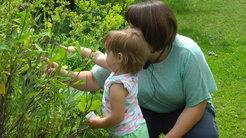Summary and Future Directions
The work of the MPRG Naturalistic Social Cognition established a novel research area within cognitive development. Our findings to date are consistent with the predicted design of PLANT systems. Specifically, infants are initially reluctant to touch plants, they minimize their subsequent contact with them, and they look more often to adults before touching plants. This kind of behavioral avoidance strategy coupled with increased social information seeking would mitigate harm from plants (e.g., poisoning, skin injury) and allow infants to glean social information before making contact with potentially dangerous plants. This initial avoidance can be overcome with social information. Infants selectively learn about plant properties, like which plants can be eaten and which ones are safe to touch, by watching what adults do. Finally, once infants have learned something about a particular plant, they generalize that information in cautious ways using fine-grained features that can distinguish between similar-looking plants. We have also collected some of the first evidence that aspects of PLANT systems are shared cross-culturally, albeit with some interesting cross-cultural variation, and that several non-human primate species show plant-specific behavioral responses, as reported in previous editions of the Research Report. In addition, our research brings a fresh lens to existing areas within the cognitive sciences and has led to new discoveries in areas such as infant categorization and visual perception.

In its entirety, our research program provides a clear example of using an evolutionary approach to uncover previously unknown areas of human cognition and demonstrates that, counter to common misunderstandings, learning and evolution are not mutually exclusive processes. Instead, evolution can build learning systems that are tailored to specific kinds of content. Because this is a novel research area, there are many open avenues to explore. Importantly, this work can also inform the design of real-world programs to engage infants and young children with plants early in life and connect them with important issues like healthy eating, biodiversity, and sustainability. This research program will continue at the University of California, Santa Barbara, in the Department of Psychological & Brain Sciences, where Dr. Annie E. Wertz has secured a tenure-track professorship.
